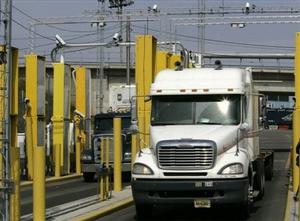Nuclear mattersU.S. nuclear weapons detection skills, capabilities deteriorate
The world is increasingly worried about nuclear weapons proliferation, so it is not good to read that a National Research Council (NRC) report warns of “concerns” over deteriorating U.S. expertise in detecting and investigating nuclear weapons; the shortage of nuclear forensics specialists could have dire consequences says the NRC: “Beyond the terrible loss of life, which in itself is difficult to appreciate fully, the successful detonation of one or more nuclear explosives in a U.S. city and the potential for more detonations could transform our nation into a national security state, focused on common defense to the detriment of the justice, general welfare, and blessings of liberty envisioned by our nation’s founders”

Detection systems need competent people, and there aren't enough of them // Source: thetruthaboutcars.com
The world is increasingly worried about nuclear weapons proliferation, so it is not good to read that a National Research Council (NRC) report warns of “concerns” over deteriorating U.S. expertise in detecting and investigating nuclear weapons.
Nuclear forensics, the ability to detect, defuse, and attribute the origin of nuclear weapons materials, remains a well-practiced discipline at Energy Department labs, says the Nuclear Forensics: A Capability at Risk report.
- Already two years ago, the International Atomic Energy Agency (IAEA) said that more atomic sleuths were needed to reinforce the world’s nuclear security. Making progress on this front represents a key international challenge, emphasized Anita Nilsson, head of the IAEA Office of Nuclear Security, in sessions at the 2008 conference of the American Association for the Advancement of Science (AAAS) in Boston (“IAEA: More nuclear sleuths needed,” 27 February 2008 HSNW). She participated in a press briefing and sessions on nuclear forensics and security. “Reports of illicit trafficking in nuclear and other radioactive material demonstrate the problem’s global dimensions and the importance of building up systems to detect and prevent cases,” she said. The IAEA Illicit Trafficking Database contains more than a thousand confirmed incidents of illicit nuclear trafficking reported over the past seventeen years.
- Also in 2008, a study from two leading U.S. scientific groups — the American Physical Society and the American Association for the Advancement of Science — warnedthat a serious shortage of nuclear forensic specialists was jeopardizing analytical capabilities essential in global efforts to prevent trafficking and potential acts of terrorism (“Number of U.S. nuclear smuggling experts to shrink,” 20 February 2008 HSNW)
Not much has changed in the last two years. The NRC panel details “concerns about the program and finds that without strong leadership, careful planning, and additional funds, these capabilities will decline.”
Dan Vergano writes in USA Today that as Iran, North Korea, and other nations have made recent moves toward atomic weapons, concern has grown about honing U.S. capabilities to determine the source of loose nukes in the world, particularly in the current era of post 9/11 terrorism.
The report details shortcomings in organization, skills, funding, personnel, and tools at U.S. national labs, where much of the nation’s nuclear forensic expertise resides.
“Beyond the terrible loss of life, which in itself is difficult to appreciate fully, the successful detonation of one or more nuclear explosives in a U.S. city and the potential for more detonations could transform our nation into a national security state, focused on common defense to the detriment of the justice, general welfare, and blessings of liberty envisioned by our nation’s founders,” says the NRC report, calling for a revitalized federal effort to streamline training in detecting and neutralizing nuclear materials.
